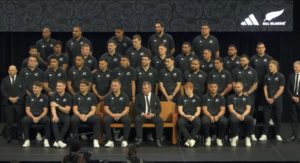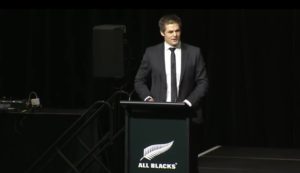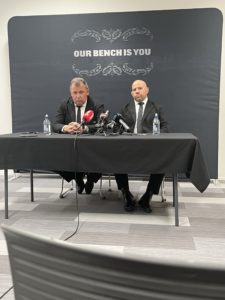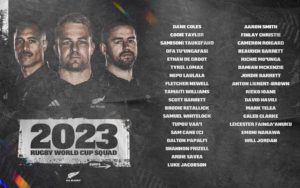Steady as she goes
0By Aiden McLaughlin
As All Black number 1014 Richie McCaw read out the 33-man Rugby World Cup squad at Taradale’s Pettigrew Green Arena on Monday evening, the alphabetical order quickly confirmed the consistency of thought that the selection panel of Ian Foster, Jason Ryan and Joe Schmidt have established during their time together.
C brought Christie and Clarke, ending the speculation that one or both may miss out.
F passed by and there was no Samipeni Finau, his strong performance against Australia in Dunedin just that bit too late to force a rethink from the three selectors.
H meant happy news for David Havili, a regular under Foster, following his return from injury for Tasman on Friday night.
Those looking for the mystical bolter, or even just a slight outsider, will have to wait until another day, another group of All Black selectors. This is a settled squad, a group unbeaten in 2023 and one with a combined 1493 test caps, the most experienced All Blacks World Cup squad in history; conversely, over half the squad, 17, are heading to their first Rugby World Cup.
The squad contains 18 forwards and 15 backs. Brodie Retallick’s posterior cruciate ligament injury sustained on Saturday has not seen the selectors name another specialist lock as cover. Instead, Shannon Frizell, one of five loose forwards named, will provide second row cover. Versatility also allows Scott Barrett and Tupou Vaa’i to cover the blindside flank.
The forwards/backs split allows Caleb Clarke and Leicester Fainga’anuku to both take their place in the five outside backs named, with likely first choice full back Beauden Barrett officially listed as one of three first five-eighths.
Throughout Foster’s involvement with the All Blacks, first as assistant to Steve Hansen, and now as head coach, loyalty to injured players has been prominent, and Havili is an example in this selection.
“David’s had a lot of time with us last year. We had a lot of faith in how he played, ” said Foster.
“We like his skill set – I think he’s come back, he’s been able to return to play in time for this so we’re sure of the decision,” he said.
On the five loose forwards, Jason Ryan said “We’re confident [that five is enough] because we’ve got some good versatility amongst them all. A lot of them can play multiple positions. Someone like Luke Jacobson is very valuable for us – he’s got good durability and can cover all three [positions].”
Just like in 2019, Retallick is unlikely to be available for the first pool match, against France. He’ll possibly be ready for the second against Namibia on September 16. After that, the All Blacks have a fortnight before their third match, against Italy, on September 30 – perhaps the sensible play will be to wait until then to see him take the field.
As well as the 33 named, Foster confirmed that three additional players will travel with the squad to London and be available for selection against South Africa in the test at Twickenham on August 26.
“That was always the plan,” said Foster.
“We’re allowed to have extra players up until we go to France, so we’re going to bring Brad Weber, Samipeni Finau and George Bell with us. To be fair it would have been Asafo Aumua, but he’s pulled a calf at the weekend and he’s out for six to eight weeks which is disappointing. In Samipeni’s case, he could potentially even be involved in the South Africa game if we feel we can utilise him to manage our lock stocks through to the start,” he said.
Although he wouldn’t specify an additional standby list, should injuries arise, Josh Lord and Joe Moody were mentioned by Foster as players that have had involvement with the squad that would fit the bill if required.
“History is full of players coming in and joining us during a campaign and making a massive difference, so that’s just a couple of names, but there will be a group – we won’t make that public because you never quite know the ramifications of who you actually need when you have injuries in a squad and the stage of the tournament you’re at, but we’ll make sure that group of players knows,” he said.
Excitement in Hawke’s Bay has been building since the venue for the team naming was widely publicised last week and with over 1000 invited guests in attendance, including people who lost their homes, members of the police, fire service, public officials, and other valuable volunteers and first responders that worked so hard in the response to Cyclone Gabrielle, Foster addressed the crowd to explain why the announcement was being made in Hawke’s Bay.
“We’ve all watched from afar the challenges this community, right through the East Coast has had, over the last six months, and I guess we’ve seen pictures and heard stories and sympathised with you, but it’s been really tough to find ways to show our support for what you’ve had to go through. So the reason we’re here is that we wanted to bring you something that’s very special to us, which is the naming of an All Blacks squad for a Rugby World Cup and give it to you as a small gift – and I know it doesn’t do much for the hardship and challenges you have had and you have going forward, but please accept as a token that you are very much in our thoughts and prayers.”
From here, the squad will spend Tuesday morning working at flood affected Tangoio Marae, north of Napier, and on Wednesday, they will hold a public training session at McLean Park between 9am and 10.30am. Just as 2022 was a tough year for the All Blacks, 2023 has been a tough year for the East Coast and other areas affected by extreme weather. The All Blacks are hoping that the upcoming campaign can show that with the right planning and execution, transformation can happen quickly. Time will tell if it brings a fourth Rugby World Cup back to Aotearoa.
Follow Aiden on Twitter




